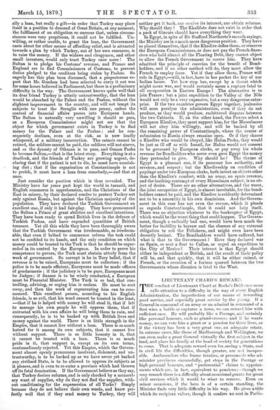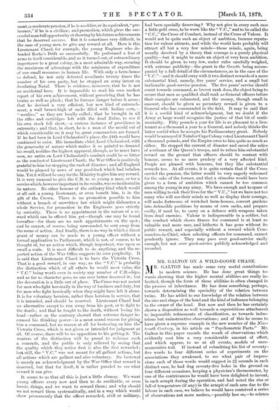LIEUTENANT CHARD'S REWARD.
THE conduct of Lieutenant Chard at Rorke's Drift once more calls attention to a difficulty in the way of every English Administration, the imperfection of our means of rewarding good service, and especially great service by the young. If a General in command of an army or an admiral in command of a fleet wins a battle or captures a town, we can reward him with sufficient ease. He will probably like a Peerage, and certainly like personal honours, such as grand-crosses ; and if he wants money, we can vote him a grant or a pension for three lives, or if the victory has been a very great one, an adequate estate. In extreme cases, like those of Marlborough and Wellington, we can even make a great General virtually the first subject in the land, and place his family at the head of society for gendations to come. That is adequate reward even for„saving a State, and in civil life the difficulties, though greater, are not insuper- able. Ambassadors who frame treaties, or proconsuls who ad- minister provinces successfully, get steps in the Peerage or high personal honours, and " preferential " claims to appoint- ments which are, in fact, equivalent to pensions ;—though we may remark there is a difficulty about occasional grants for great civil services which it would be wiser to remove. Even on minor occasions, if the hero is of a certain standing, the Minister finds very little difficulty in his way. He gives a title which its recipient values, though it confers no seat in Pasha-
ment; a moderate pension, if he is a soldier, or its equivalent, "pre- ference," if he is a civilian ; and promotion, which gives the suc- cessful man full opportunity of showing by his future achievements that he deserved success. But it is sometimes very difficult, in the case of young men, to give any reward at all. Here is this lieutenant Chard, for example, the young Engineer who de- fended Rorke's Drift so successfully. He performed a feat of arms in itself considerable, and as it turned out, of extraordinary importance to a great colony, in a most admirable way, securing the maximum of advantage with the minimum of expenditure of our small resources in human life. With only a farm-house to defend, he not only defeated assailants twenty times the number of his own party, but he stopped an army intent on desolating Natal. There is evidence, moreover, that he is not an accidental hero. It is impossible to read his own modest report of his own achievement, without perceiving that he has brains as well as pluck ; that he foresaw danger before it arose; that he devised a very efficient, but new kind of entrench- ment, a wall breast-high -of sacks filled with Indian corn,— " mealies," as they are locally called ; that he brought in all the rifles and cartridges left with the dead Zulus, to use if his own stock fell short,—a curious instance of providence in extremity ; and that, in short, he is a man of the mould out of which considerable or, it may be, great commanders are formed. If he had been in Lord Chelmsford's place, the 24th would have continued to exist. His immediate chief, Lord Chelmsford, with the generosity of nature which makes it so painful to demand his recall, testifies the highest approval, though, as he must have seen, no satire on Lord Chelmsford's conduct could be so bitter as the conduct of Lieutenant Chard; the War Office is positively grateful to him for stopping the rush of disaster ; and all England would be pleased by news of any good-luck which had befallen him. Yet it will not be easy for the Ministry to give him any reward. It is very unusual to give the C.B. to so young a man, or for a service which, however important in its results, was so incidental in its nature. No other honour of the ordinary kind which would at all suit a young lieutenant, or even benefit him, is in the gift of the Crown. There is no promotion possible to him without a breach of unwritten law which might dishearten a whole Service, for promotion in the Engineers goes strictly by seniority. There is no appointment in the nature of a re- ward which can be offered him yet—though one may be found hereafter—for there are no such appointments on the spot ; and he cannot, of course, being unwounded, be sent away from the scene of action. And finally, there is no way in which a direct grant of money can be made to a young officer without a formal application to Parliament, which is not, of course, to be thought of, for an action which, though important, was upon so small a scale. It is most difficult to do anything, and the re- ported action of the War Office suggests its own perplexity. It is said that Lieutenant Chard is to have the Victoria Cross. That is a good reward, in one way, as the "V.C." is probably the distinction which of all others he would most value, the " V.C." being worth even in society any number of C.B.-ships, and as far as character goes, no one ever better deserved it ; but the decoration is a little out of place. The Cross was not meant for men who fight heroically in the way of business and duty, but for men who fight heroically when they might have left it alone. It is for voluntary heroism, rather than heroism in service, that it is intended, and should be reserved. Lieutenant Chard had no alternative except to run away from his post, or to fight to the death; and that he fought to the death, without losing his head—rather on the contrary showed that extreme danger in- creased his thinking power—is a most sound reason for giving him a command, but no reason at all for bestowing on him the Victoria Cross, which is not given or intended for judgment at all. Of course, there will be no opposition to his getting it. The wearers of the distinction will be proud to welcome such a comrade, and the public is only relieved by seeing that the quality which they notice first is also the first rewarded ; but still, the " V.C." was not meant for all gallant actions, but all actions which are gallant and also voluntary. Its bestowal is merely an acknowledgment by the War Office that reward is deserved, but that for itself, it is rather puzzled to see what reward it can give.
It seems to us that all this is just a little clumsy. We want young officers every now and then to do creditable, or even heroic, things, and we want to reward them; and why should we not reward them systematically, and in a way which would show permanently that the officer rewarded, civil or military,
had been specially deserving? Why not give in every such case a little gold cross, to be worn like the " V.C.," and to be called the " C.C.," the Cross of Conduct, instead of the Cross of Valour. It
would not be quite such an object of ambition, because reputa- tion for valour attracts, and while the world lasts probably will attract all but a very few minds—those minds, again, being
usually deceived by a theory that courage is a purely physical quality—but it might be made an object of very keen ambition. It should be given to very few, under rules carefully weighed, with extreme publicity—the grant in the Gazette being accom- panied by a full detail of the circumstances, as in the case of the " V.C."—and it should carry with it two distinct rewards of a more substantial kind, namely, five years' service, and a small but inalienable good-service pension. The five years' service should count towards command, as brevet rank does, the object being to secure that men so qualified shall rank as General officers before their energies are exhausted, and the money, though small in amount, should be given as pecuniary reward is given to a General who has commanded in the field. It may be said that it is a sordid kind of acknowledgment, but we doubt if the Army at large would recognise the justice of that bit of senti- mentality. Fifty pounds a year for life is as pleasant to a lieu- tenant as a thousand a year to a General, and nobody thinks the latter sordid when he accepts his Parliamentary grant. Nobody would be annoyed if Natal or Cape Colony voted Lieutenant Chard a thousand pounds, and the Empire owes to him quite as much as either. He stopped the current of disaster and saved the relics of a column of the Queen's troops, and to refuse him substantial reward on the ground that officers should be content with honour, seems to us mere prudery of a very affected kind. People are pleased with honours, but they like substantial rewards too. At all events, it is quite certain that if the Cross carried the pension, the latter would be very eagerly welcomed for the sake of the former, and that a stimulus would have been given to a form of ambition which cannot be too common among the young in any army. We have enough and to spare of men willing to risk their lives for the " V.C.," but we have not too many who will use their minds as well as display their courage, will make fortresses of wretched farm-houses, convert gardens into defensible positions by means of corn sacks, and prepare coolly, if need be, to carry on a defence with weapons taken from dead enemies. Valour is indispensable in a soldier, but the conduct which shows fitness for command is at least as valuable and more rare, and hitherto it has gone without its public reward, and especially without a reward which Ccm- manders-in-Chief, when selecting officers for command, cannot prudently ignore. They may pass over good-service easily enough, but not over good-service publicly acknowledged and recorded.



































 Previous page
Previous page